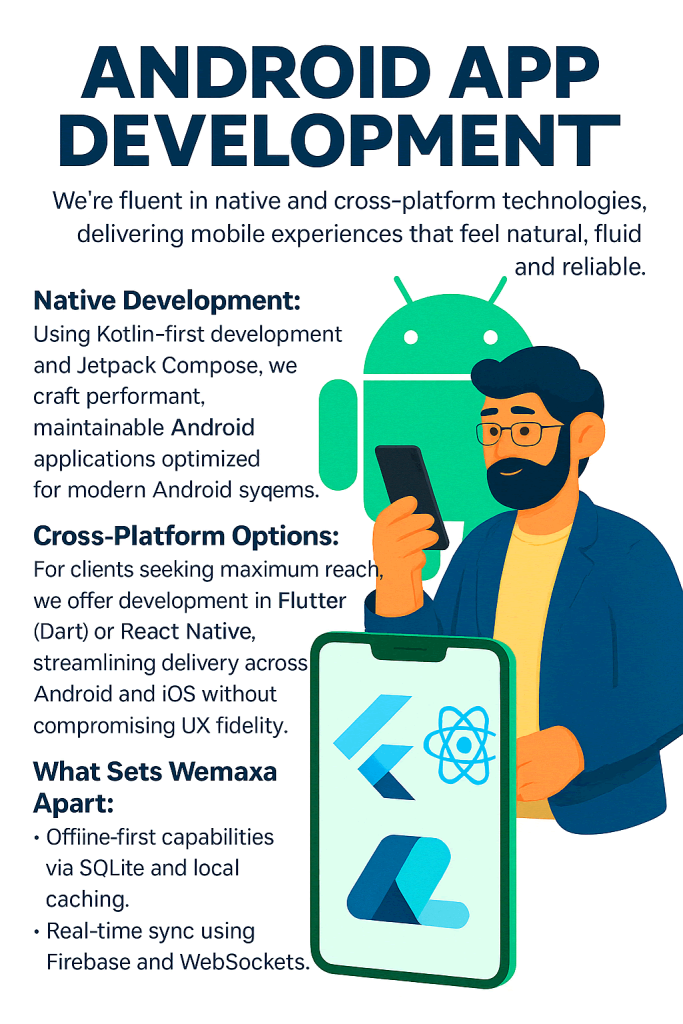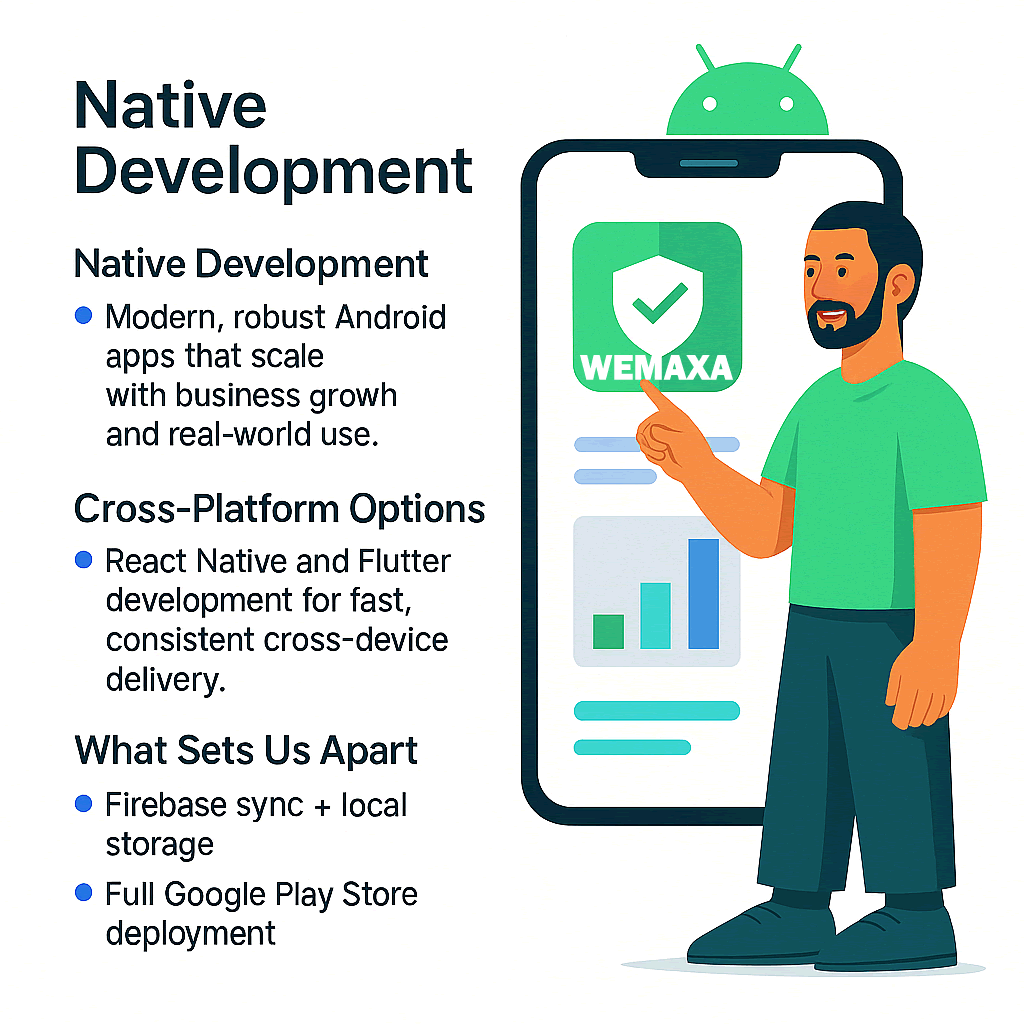CUSTOM ANDROID APP DEVELOPMENT IN KOTLIN
At Wemaxa, we bring your mobile vision to life using both native and cross-platform technologies. Our development approach ensures every app feels natural, fluid, and reliable regardless of device or platform. We specialize in Kotlin-first development, leveraging Jetpack Compose to build highly responsive, modern Android applications. Every line of code is written for scalability and long-term maintainability. Our native apps are optimized for the latest Android OS, delivering consistent performance even under high user loads or poor network conditions. Need to reach users on both Android and iOS? We provide seamless cross-platform solutions using Flutter (Dart) or React Native. These frameworks allow for rapid deployment without compromising visual integrity or native-like responsiveness. From gesture support to adaptive UI components, we ensure your app behaves exactly as users expect.

Custom UI/UX Web Design for Mobile
Every app we design is with intuitive flows, minimal friction, and smooth animations that elevate the overall user experience. We test on real devices to guarantee behavior matches expectations.

Offline-first Website Designs
We at Wemaxa enable your users to stay productive even without internet access through robust local caching, SQLite integration, and smart sync queues.
Real-time AI assisted Data Sync
We integrate Firebase Realtime Database, Firestore, and WebSocket protocols to keep data synced across devices instantly and reliably.
Full Deployment Pipeline
We handle every step of the release process, including store asset preparation, bundle signing, testing, and Google Play Store rollout. From internal testing tracks to public releases, you’re fully supported.
To learn more about Android app development best practices, you can explore resources such as Google’s official Android Developers site, Android Authority, or read about mobile UX design on Smashing Magazine. Staying updated with industry trends ensures that your custom app remains competitive and future-proof in the rapidly changing world of mobile technology.
In today’s mobile-first environment, Android applications are no longer optional but fundamental to building a strong digital presence. With more than 70% of global smartphones running on Android, businesses cannot afford to overlook the opportunities presented by this platform. Custom Android app development is not just about coding an application; it is about building a product that is tailored to your brand, your users, and your long-term goals. Whether you are a startup trying to launch your first MVP or an established enterprise aiming to streamline your services, Android apps offer scalability, adaptability, and performance that are essential for sustainable growth in competitive markets.

Developing a custom Android application requires more than technical skill. It demands a deep understanding of the Android ecosystem, user interface guidelines, and user experience best practices. For example, a retail business aiming to improve customer engagement may need an app that integrates loyalty programs, push notifications, and AI-driven product recommendations. A healthcare company, on the other hand, might require HIPAA-compliant features, real-time communication tools, and robust encryption layers. By taking a custom development approach, each business receives a solution that aligns with its specific industry requirements and customer expectations rather than relying on generic templates that limit creativity and performance.
Many companies underestimate the importance of backend integration when developing their apps. A polished front-end is useless if the backend cannot handle user demands or scale as the business grows. In custom Android app development, backend architecture plays a crucial role. This includes secure database management, cloud synchronization, payment gateway integration, and seamless API connections with third-party services. For example, an e-commerce Android app needs real-time inventory management and safe, fast checkout processes to compete with established platforms. Without strong backend integration, user satisfaction quickly declines, leading to abandoned apps and wasted investment.
One of the advantages of custom Android development is the ability to leverage native Android features such as biometric authentication, Google Maps integration, augmented reality modules, and AI-powered analytics. Businesses can stand out from competitors by providing functionality that is deeply aligned with user habits and mobile device capabilities. Think of a fitness application that uses GPS for real-time workout tracking and integrates with wearable devices, or a travel app that leverages geolocation, camera features, and personalized itinerary suggestions. These advanced, device-specific features are what transform a simple mobile application into a daily tool that users depend on.
Security is another pillar of custom Android app development. With the rising number of cyber threats, businesses must prioritize protecting customer data. Unlike off-the-shelf apps, a custom-built solution allows for tailored security protocols such as end-to-end encryption, multi-factor authentication, secure payment systems, and ongoing vulnerability testing. Consider financial services apps: customers need complete assurance that their transactions and personal details are protected at all times. A custom-built Android app ensures that security is baked into the architecture from the start rather than patched as an afterthought.

Scalability also sets custom development apart from pre-made solutions. Businesses often start small but need to expand their apps as demand grows. A well-structured Android app is built with scalability in mind, ensuring that it can handle thousands or even millions of users without crashing. For instance, an educational platform might start with a small user base, offering simple course browsing features. Over time, it can expand to include video streaming, AI tutoring assistants, and integration with multiple universities. By planning for scalability during the initial development phase, businesses avoid costly rebuilds in the future.
Personalization plays a major role in user retention. Custom Android apps can integrate advanced machine learning and artificial intelligence to deliver personalized recommendations, predictive search, and adaptive interfaces. For example, a food delivery app can learn a user’s favorite cuisines and suggest restaurants accordingly. This personalized experience increases user engagement and makes the application feel intuitive and responsive. Businesses that leverage personalization through custom Android development can cultivate stronger relationships with their customers, leading to repeat use and higher customer lifetime value.
The long-term benefit of custom Android app development lies in full ownership and control. When you rely on third-party platforms or pre-packaged app builders, you are always limited by their rules, updates, and monetization models. With a custom solution, your business owns the codebase, the features, and the data, giving you complete flexibility to innovate without external restrictions. This independence becomes crucial for industries where compliance, branding, and customer data protection are non-negotiable. Full ownership also makes it easier to pivot or expand your product as new opportunities emerge in the market.
Real-world examples highlight the advantages of custom Android app development. Consider an online store that initially launched with a template-based app. The store struggled with limitations in design, speed, and customization, leading to low adoption rates. After switching to a custom-built Android app that integrated payment gateways like PayPal and Stripe, added AI-based product suggestions, and optimized loading speeds, the business saw a 300% increase in conversions within months. Another case involves a logistics company that developed a custom Android app with GPS tracking and real-time driver updates, which significantly reduced delivery delays and improved customer satisfaction.
Partnering with the right development team is as important as the app itself. A trusted Android development team should not only write clean and efficient code but also provide consulting on user experience, branding, marketing, and scaling strategies. They should act as long-term partners, helping the business evolve the app as technology changes and customer needs grow. With experienced developers, businesses can avoid pitfalls, reduce time to market, and create apps that achieve measurable results.


